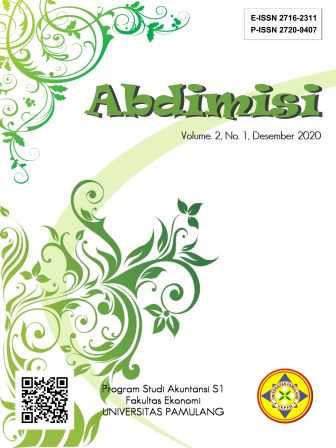Peningkatan Good Governance Melalui Penerapan Kaizen
DOI:
https://doi.org/10.32493/abms.v2i1.4707Keywords:
Good Governance, Kaizen, Financial StatementsAbstract
Kaizen literally means "Improvement". This understanding gives broad meaning to the application of Kaizen in everyday life. The Kaizen concept is defined as continuous improvement with 5 (five) foundations, namely group activities, discipline, moral development, quality control, and suggestions for improvement that come from all relevant parties. Seeing this we consider the importance of Kaizen being applied in schools. One application of Kaizen is the preparation of financial reports, which in SDIT Al Inayah there are no financial reports. This certainly has an impact on the going concern of the school. The method of implementation was carried out with the first survey related to what was needed by the Al Inayah SDIT. It turns out that what is needed by SDIT Al Inayah is in line with our PKM theme, which is the preparation of financial reports. After that, for five weeks every week, twice, our team helped make financial reports in July-September 2019 SDIT Al Inayah by using an application system, which previously was still manual in several books. The result of this PKM is the realization of SDIT Al Inayah's financial reports in the application system for July-September 2019. In addition, SDIT Al Inayah now also understands the importance of making relevant and accountable financial statements.
References
Dwiyanto, Agus. (2009). Mewujudkan Good Governance Melalui Pelayanan Publik. Yogyakarta : Gajah Mada Univercity Press.
Imai, Masaaki. (1994). KAIZEN (Ky’zen). Kunci Sukses Jepang Dalam Persaingan. Jakarta Pusat: PT Pustaka Binaman Pressindo.
Imai, Masaaki. (1996). Gemba Kaizen. Jakarta Pusat: PT Pustaka Binaman Pressindo. Imai, Masaaki. 2008. The Kaizen Power. Yogyakarta: Think.
SMK Farmasi Nasional Surakarta. (2018). PENERAPAN 5R (RINGKAS, RAPI, RESIK, RAWAT, RAJIN). Melalui link http://www.smkfarmasinasional.sch.id/post-penerapan- 5r-ringkas-rapi-resik-rawat-rajin.html. Diakses 23 Oktober 2019.
SMP Cendekia Baznas. (2019). 5R, Bentuk Karakter Siswa yang Cinta Kebersihan. Melalui link https://www.cendekiabaznas.sch.id/5r-bentuk-karakter-siswa-yang-cinta- kebersihan/. Diakses 23 Oktober 2019
Yenny. (2013). Prinsip-prinsip Good Governance. Jurnal Fisip Unmul Vol.1 p.3. Melalui link http://ejournal.an.fisip-unmul.ac.id/site/wp- content/uploads/2013/03/EJOURNAL%20YENNY%20(03-02-13-06-48-29.pdf. Diakses 23 Oktober 2019.
Downloads
Published
Issue
Section
License
Copyright Notice
Authors who publish with this journal agree to the following terms:
- Authors retain copyright and grant the journal right of first publication with the work simultaneously licensed under a Creative Commons Attribution License that allows others to share the work with an acknowledgement of the work's authorship and initial publication in this journal.
- Authors are able to enter into separate, additional contractual arrangements for the non-exclusive distribution of the journal's published version of the work (e.g., post it to an institutional repository or publish it in a book), with an acknowledgement of its initial publication in this journal.
- Authors are permitted and encouraged to post their work online (e.g., in institutional repositories or on their website) prior to and during the submission process, as it can lead to productive exchanges, as well as earlier and greater citation of published work (See The Effect of Open Access).
Abdimisi have CC-BY-SA or an equivalent license as the optimal license for the publication, distribution, use, and reuse of scholarly work.
In developing strategy and setting priorities, Abdimisi recognize that free access is better than priced access, libre access is better than free access, and libre under CC-BY-SA or the equivalent is better than libre under more restrictive open licenses. We should achieve what we can when we can. We should not delay achieving free in order to achieve libre, and we should not stop with free when we can achieve libre.
You are free to:
- Share — copy and redistribute the material in any medium or format
- Adapt — remix, transform, and build upon the material for any purpose, even commercially.
- The licensor cannot revoke these freedoms as long as you follow the license terms.

